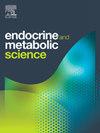硫辛酸调节来曲唑诱导的多囊卵巢综合征大鼠的促炎细胞因子和激素
Q3 Medicine
引用次数: 0
摘要
多囊卵巢综合征(PCOS)是一种常见的内分泌紊乱,影响5 - 10%的育龄妇女,伴有生殖和代谢紊乱,如无排卵/少排卵、高胰岛素血症、葡萄糖耐受不良、肥胖和血脂异常。在其他异质性症状中,研究已将多囊卵巢综合征与低度慢性炎症联系起来。α -硫辛酸(ALA)是线粒体必需的辅助因子,也是一种安全的天然分子,具有抗氧化剂的作用。本研究采用来曲唑诱导的PCOS大鼠模型,研究ALA对炎性细胞因子如白细胞介素-6 (IL-6)、肿瘤坏死因子-α (TNF-α)以及激素如睾酮(T)、黄体生成素(LH)和胰岛素的影响。将28只大鼠随机分为1、2、3、4组(对照组、PCOS、PCOS+二甲双胍(MET) +柠檬酸克罗米芬(CC)、PCOS+ALA),每组7只。口服来曲唑1 mg/kg/d诱导PCOS 21 d。PCOS大鼠口服ALA (1 mg/d),对照药(7.14 mg/kg/d MET与2 mg/kg/d CC共给药),连续14 d。结果显示,与对照药物治疗PCOS组相比,ALA完全逆转了PCOS大鼠持续发情和发情期的不周期性。ALA降低血清空腹血糖、IL-6、TNF-α、总胆固醇(TC)、甘油三酯(trigs)、低密度脂蛋白-胆固醇(LDL-C)、胰岛素和LH。血清高密度脂蛋白-胆固醇(HDLC)显著升高(p <;0.05),与对照组比较差异有统计学意义(p < 0.05)。因此,ALA作为促炎细胞因子和生殖因子的调节因子的功效可用于开发多囊卵巢综合征的治疗方法。本文章由计算机程序翻译,如有差异,请以英文原文为准。
Alpha-lipoic acid regulates pro-inflammatory cytokines and hormones in letrozole-induced polycystic ovary syndrome in rats
Polycystic ovary syndrome (PCOS) a common endocrine disorder affecting 5–10 % of women in their reproductive age with reproductive and metabolic disorders such as anovulation/oligo-ovulation, hyperinsulinemia, glucose intolerance, obesity and dyslipidemia. Among other heterogeneous symptoms, studies have linked PCOS to low-grade chronic inflammation. Alpha-lipoic acid (ALA), an essential mitochondrial co-factor and safe natural molecule acts as an antioxidant. In this study, letrozole-induced PCOS rat model was used to investigate the effect of ALA on inflammatory cytokines such as interleukin-6 (IL-6), tumor necrosis factor-alpha (TNF-α), and hormones such as testosterone (T), luteinizing hormone (LH) and insulin. Twenty-eight rats were randomly divided into four groups of seven rats each- Group 1,2,3 and 4 (Control, PCOS, PCOS+metformin (MET) + clomiphene citrate (CC), and PCOS+ALA respectively). PCOS was induced by orally administering 1 mg/kg/day of letrozole for 21 days. ALA (1 mg/day) was administered orally to PCOS rats, and the reference drugs (7.14 mg/kg/day of MET co-administered with 2 mg/kg/day CC) were given orally for 14 days. Results revealed acyclicity in the oestrous cycle of PCOS rats characterized by persistent estrus and diestrus phases was completely reversed by ALA compared to the reference drug-treated PCOS group. ALA decreased serum fasting blood sugar, IL-6, TNF-α, total cholesterol (TC), Triglycerides (trigs), low-density lipoprotein-cholesterol (LDL-C), insulin, and LH. Serum high-density lipoprotein-cholesterol (HDL![]() C) was significantly increased (p < 0.05) in the ALA-treated group compared to the control rats. Therefore, the efficacy of ALA as a regulator of pro-inflammatory cytokines and reproductive factors can be exploited in developing treatments for PCOS.
C) was significantly increased (p < 0.05) in the ALA-treated group compared to the control rats. Therefore, the efficacy of ALA as a regulator of pro-inflammatory cytokines and reproductive factors can be exploited in developing treatments for PCOS.
求助全文
通过发布文献求助,成功后即可免费获取论文全文。
去求助
来源期刊

Endocrine and Metabolic Science
Medicine-Endocrinology, Diabetes and Metabolism
CiteScore
2.80
自引率
0.00%
发文量
4
审稿时长
84 days
 求助内容:
求助内容: 应助结果提醒方式:
应助结果提醒方式:


